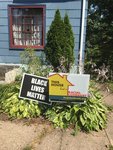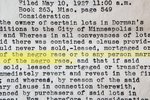


The greater Longfellow neighborhood is one of the most progressive communities in Minnesota. Black Lives Matter and All Are Welcome Here signs are on practically every block. Yet, even as White neighborhood progressives joined racial justice groups in the aftermath of the police killing of George Floyd to learn more about historic and existing systemic racism, Longfellow remains one of the Whitest neighborhoods in the city.
In fact, the racial concentration of White people in our neighborhoods was by design. For decades in the mid-20th century, White homeowners and housing developers inserted language into property deeds barring the sale of the home to people of color, primarily Blacks. The Mapping Prejudice Project at the University of Minnesota dug into the history of these racial covenants in Minneapolis (and later to Hennepin County and other communities). Their research discovered the first recorded racial covenant in the Longfellow neighborhood in 1910. It read in part that “the premises shall not at any time be conveyed, mortgaged or leased to any person or persons of Chinese, Japanese, Moorish, Turkish, Negro, Mongolian or African blood or descent.”
After 1910, the use of racial covenants in Minneapolis proliferated, along with other cities throughout the country. Early housing developers applied racial covenants to entire blocks, even before the homes were built and sold. This strategy effectively built neighborhoods exclusively for White people for generations, long after racial covenants were declared illegal. In Minneapolis, Edmund Walton was one of the city’s early developers to use racial covenants on his Longfellow neighborhood projects. Edmund Boulevard is named after him.
This history of the legal discrimination underlying our neighborhood was largely invisible until the Mapping Prejudice Project began to reveal it. In 2019, Longfellow’s State Representative Jim Davnie authored legislation that streamlined the process by which property owners could discharge racial covenant language from their deeds. In response to the new legislation, Minneapolis joined 10 other Hennepin County cities to form the Just Deeds coalition to “provide free legal and title services to help property owners find discriminatory covenants and discharge them from their property titles.”
Enter Free The Deeds.
Free The Deeds is a public art project in Minneapolis that invites people to engage with the history of racial covenants, confront their harmful legacy, and begin to repair the harm left in their wake. The project builds on the work of the Mapping Prejudice Project and Just Deeds through public art in the form of lawn signs. Their goal is to have every racially restrictive covenant in the city discharged so that every community is a truly welcoming one for people of all races. Their lawn signs draw attention to the existence of racial covenants and act as an invitation for more awareness and conversation about the discrimination underlying our communities.
Free The Deeds also moves the conversation around racial covenants from awareness to beginning to repair the harm by inviting people to make donations to the emerging African American Community Land Trust (AACLT). The AACLT is a project of the City of Lakes Community Land Trust, which provides affordable homeownership opportunities to low- and moderate-income families. The AACLT helps Black families get into homeownership and start to build generational wealth of their own.
Of course racial covenants were not the only factor in creating racially segregated neighborhoods. Along with covenants, bank redlining, racial intimidation and violence, federal policies, realtor practices, and zoning codes all cooperated to build the segregated housing patterns that still impact where people live today.
Yet, revealing the existence of racial covenants is a powerful place to start the conversation about the discriminatory rules and legal structures that denied economic stability and wealth-building opportunities for Blacks and other people of color, even as Whites were able to use the system to build wealth for themselves and their families over generations.
Some may question whether it really matters if a racial covenant that was made illegal over 50 years ago is removed or not, or if putting a lawn sign in your yard will really make a difference. To that, Free The Deeds organizers would say yes. Even if covenants are no longer enforceable, their legacy of harm still remains, as evidenced by what our neighborhoods still look like, who has access to good schools, safe and healthy homes, and economic opportunities. That, along with the tremendous gap in homeownership and wealth between Whites and Blacks, shows us that racial discrimination in housing is not only historic, but contemporary.
Racial covenants remind us that our neighborhood was built on the idea of White exclusiveness. Discharging your covenant, and posting a Free The Deeds lawn sign tells your current and future neighbors that you cared enough to help build a welcoming place. It is a small step to live out one’s belief that Black lives do indeed matter, and that yes, all really are welcome here.
For more information on Free The Deeds, go to freethedeeds.org
To sign up to get a racial covenant discharged, search “Just Deeds Minneapolis.”
To learn more about the Longfellow Community Council’s Equitable Housing Committee work, contact Justin Gaarder at Justin@longfellow.org.
Comments
No comments on this item Please log in to comment by clicking here